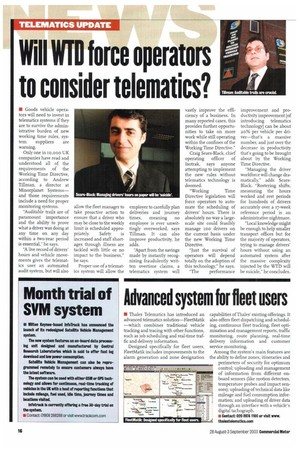Will WM force operators to consider telematics?
Page 16

If you've noticed an error in this article please click here to report it so we can fix it.
• Goods vehicle operators will need to invest in telematics systems if they are to survive the administrative burden of new working time rules, system suppliers are warning.
Only one in io,000 UK companies have read and understood all of the requirements of the Working Time Directive, according to Andrew Tillman, a director at Ivlinorplanet Systems— and those requirements include a need for proper monitoring systems.
"Auditable trails are of paramount importance and the ability to prove what a driver was doing at any time on any day within a two-year period is essential," he says.
"A live record of drivers' hours and vehicle movements gives the telematics user an automated audit system, but will also allow the fleet manager to take proactive action to ensure that a driver who may be dose to the weekly limit is scheduled appro priately. Safety is increased and staff shortages through illness are tackled with little or no impact to the business," he says.
Proper use of a telematics system will allow the
employer to carefully plan deliveries and journey times, meaning no employee is ever unwittingly overworked, says Tillman. It can also improve productivity, he adds.
"Apart from the savings made by instantly recognising fraudulently written overtime claims, a telematics system will vastly improve the efficiency of a business. In many reported cases, this provides further opportunities to take on more work while still operating within the confines of the Working Time Directive."
Craig Sears-Black, chief operating officer of Isotrak, says anyone attempting to implement the new rules without telematics technology is doomed.
"Working Time Directive legislation will force operators to automate the scheduling of drivers' hours. There is absolutely no way a largescale site could feasibly manage roo drivers on the current basis under the new Working Time Directive.
"rust the survival of operators will depend totally on the adoption of this technology," he says.
"The performance improvement and productivity improvement [of introducing telematics technology] can be about 20% per vehicle per driver—that's a massive number, and just over the decrease in productivity that's going to be brought about by the Working Time Directive.
"Managing the driver workforce will change dramatically," adds SearsBlack. "Rostering shifts, measuring the hours worked and rest periods for hundreds of drivers accurately over a 17-week reference period is an administrative nightmare.
"Local knowledge might be enough to help smaller transport offices but for the majority of operators, trying to manage drivers' hours without using an automated system after the massive complexity injected by the WTD will be suicide," he concludes.




































































































































































